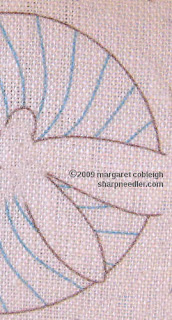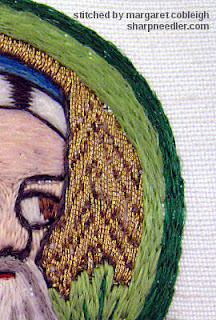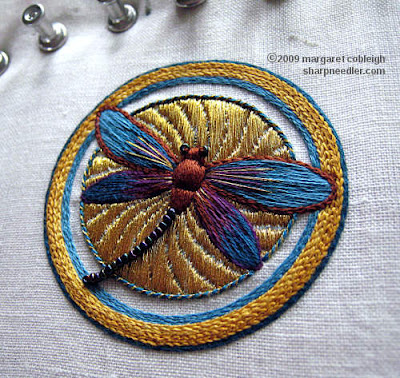My first attempt at this technique was quite rough, so I definitely wanted to try it again.
There are plenty of online sources for details on underside couching. Suffice to say, it basically consists of laying a pair of fine gold threads on top of the ground fabric and then you couch the threads down. Unlike regular couching, however, instead of laying the couching thread over the top of the gold threads, you bring the couching thread up and over the gold and then go back down into the same hole gently pulling a little bit of the gold threads to the back of the fabric. This leaves an indentation in the gold on the top. It's a really cool look!
 After I took the Little Man class, amongst other classes at the same event, I was asked if I could teach any of the techniques to my local EGA chapter. I immediately thought about underside couching, but I wanted to use it on a more modern design. I didn't want to do a medieval piece.
After I took the Little Man class, amongst other classes at the same event, I was asked if I could teach any of the techniques to my local EGA chapter. I immediately thought about underside couching, but I wanted to use it on a more modern design. I didn't want to do a medieval piece.So, I turned to the Victorian era! I espied a dragonfly on a piece of antique silverplate which I thought would lend itself to embroidery. I also intended the design as a stash-buster where stitchers could stitch the dragonfly and any non-gold areas however they liked using whatever materials they preferred.
I made a fairly simple background pattern with the dragonfly on top, and the main thing I was curious about was how far the gold could span between couching stitches and still maintain tension. The blue lines in the image to the right are the couching lines. The gold is laid vertically and as it intersects with a blue couching line you make a couching stitch.
I used Kreinik Japan thread #1 and stitched through two pieces of handkerchief linen. These were the same supplies used in the Little Man class. For the couching thread I used white Gutermann top stitching thread and the couching needle was a Bohin #22 chenille.
I definitely pushed the distance between couching stitches, but it worked as long as the piece remains under tension. The only thing I found a little frustrating was where the couching lines went horizontal and met up with the weave of the ground fabric. You get a bigger couching hole when everything aligns, unfortunately. In future, that would be something to keep in mind when designing the couching pattern. With this small project it doesn't matter.
Below is a section of finished couching before burnishing with scissors handles. You can see some of the longer lengths of gold.
Here's the completed background after burnishing which makes the gold behave better:
I find the back of underside couching fascinating. The reverse of the embroidery shows the little bits of gold that are pulled to the back along the curved couching lines.
Once the background was finished, I raided my stash to play with the dragonfly. The edges of underside couching are not very pretty, so you want to make sure to cover them.
I stitched two dragonflies in order to demonstrate using different colours and alternate ways of filling the outer circles. The outer circles were deliberately designed to give the embroiderer options of how to fill (or not fill) them. Both of my versions used DMC floss with touches of the Kreinik #1 gold, and a few beads.
Overall, I was pleased with how these little guys turned out. I was able to try underside couching on a non-medieval design and play with the stitching on the dragonflies. I'm looking forward to using underside couching on future projects perhaps with real gold!







beautiful work. Enjoy reading your blog.
ReplyDeleteMallika
Thank you!
DeleteBoth of your dragonflies are beautiful! I'm fascinated by your underside couching too and would love to learn the technique ❤ I really like the more modern design you've come up with!
ReplyDeleteThank you, Aurelia. Underside couching is really interesting and well worth a try!
DeleteLovely! Thank you for showing how to apply and work this technique.
ReplyDeleteIt's my pleasure to share.
DeleteThese are fabulous! The gold can be substituted with silver, right? I just love your blog. I always learn something new and love to see your process unfold. Always fascinating.
ReplyDeleteYes, of course, you could use silver! I'm kind of curious about trying non-metal/metallic threads to see if they might work. I don't know how much of the effect is dependent upon a somewhat stiff thread, but it would be worth a try.
DeleteLooking really good! I still haven't tried this underside couching myself ...
ReplyDeleteThank you. You should try it, especially if you're interested in medieval embroidery. The next time I try the technique, I want to see if I can get even neater couched lines. The dragonflies have much cleaner lines than my first effort, but I want the couched lines to be even sharper, if possible.
DeleteIt looks lovely. Did you pad the area underneath the gold thread?
ReplyDeleteNo padding, no felt, no anything under the gold thread.
DeleteReally beautiful! Interesting to see what the underneath looks like.
ReplyDelete